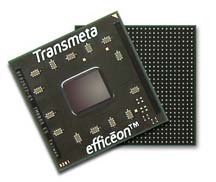Transmeta launches 90nm Efficeon processor
Santa Clara (CA) - The Efficeon TM 8800 is Transmeta's first chip which is manufacturer in 90nm and the industry's first low-power processor to include NX-technology to prevent buffer overflow attacks on a computer system.
Transmeta said that it has begun this month with "limited production shipments" of its second generation Efficeon processor TM8800. The new chip is manufactured in a 90nm CMOS semiconductor technology. Transmeta also increased the maximum clock speed of the product. While the previous 86xx generation topped out at 1.1 GHz, the 8800 offers 1.6 GHz.
The new Efficeon also comes with its own version of NX technology which the company names "AntivirusNX" and which was previously introduced in AMD's Opteron and Athlon64 chips, and Intel will offer first in Prescott Pentium 4 processors. Transmeta initially announced to support the technology included with Microsoft's Windows XP Service Pack 2 last May. Now, the company can claim to offer the first low power x86-microprocessor to provide hardware support for the anti-virus protection.
Transmeta said that it will formally introduce the processor on October 5th at the Fall Processor Forum, in San Jose, California. Next to the 1.6 GHz version, it will also ship a 1.4 GHz version, spokesperson Ken Durance said. Before year end the company expects to sample 2 GHz 8800 chips.
Transmeta did not detail the term "limited production" but said that it sees a fairly quick ramp-up of the processor. According to a report from press agency AP, Transmeta however faces once again "manufacturing difficulties", which forced the company to lower its revenue forecast for the current quarter to $6.8 to $7.5 miliion from previously set $8 million to $8.7 million.
Transmeta's processors remain a rare sight in American and European markets and are primarily used by manufacturers for users in Asia Pacific. However, Transmeta is still trying to find its way into other markets to increase its sales. In 2002, the company had hoped that Tablet PCs might be that opportunity, but turned out to be a niche market so far. Most recently, a new potential might be created by high-density cluster systems , as announced by Orion Multisystems. The start-up plans to offer 12 and 96-node clusters for the desktop using 1.6 GHz Efficeon processors in the next few weeks.
Get Tom's Hardware's best news and in-depth reviews, straight to your inbox.

Wolfgang Gruener is an experienced professional in digital strategy and content, specializing in web strategy, content architecture, user experience, and applying AI in content operations within the insurtech industry. His previous roles include Director, Digital Strategy and Content Experience at American Eagle, Managing Editor at TG Daily, and contributing to publications like Tom's Guide and Tom's Hardware.
